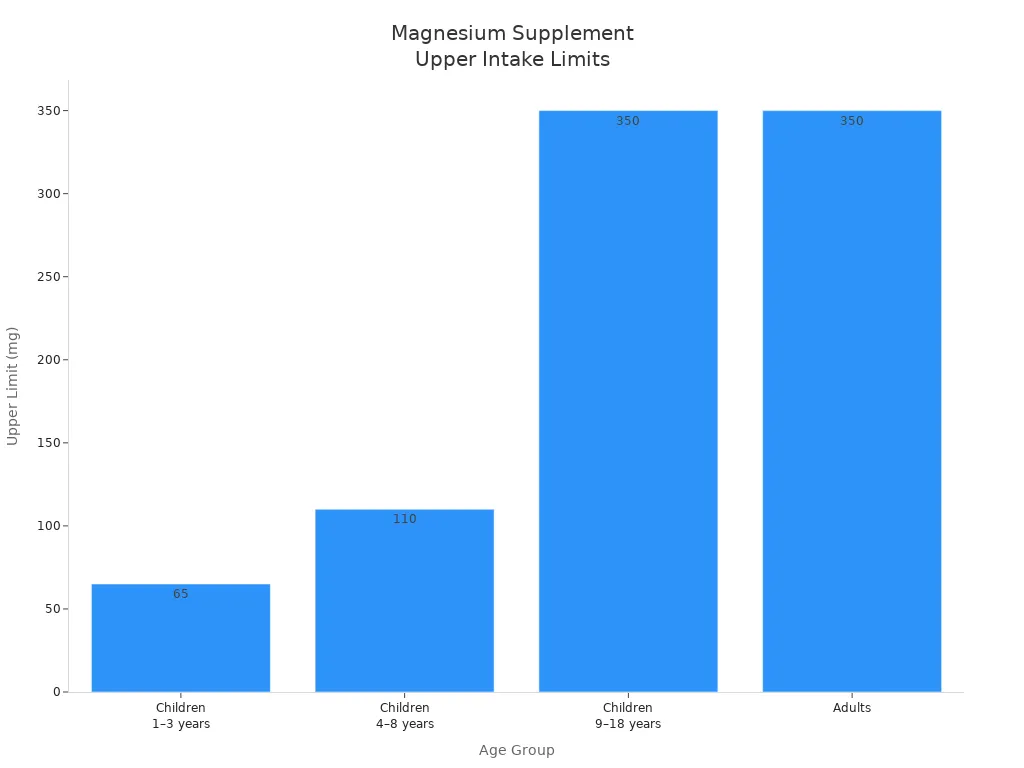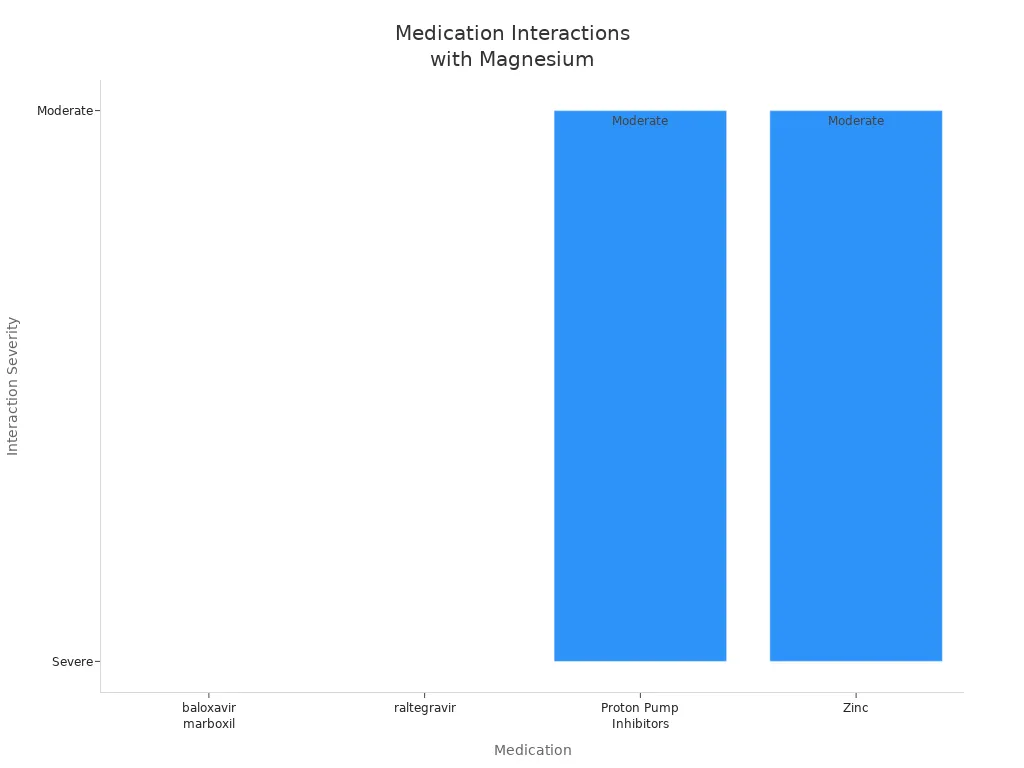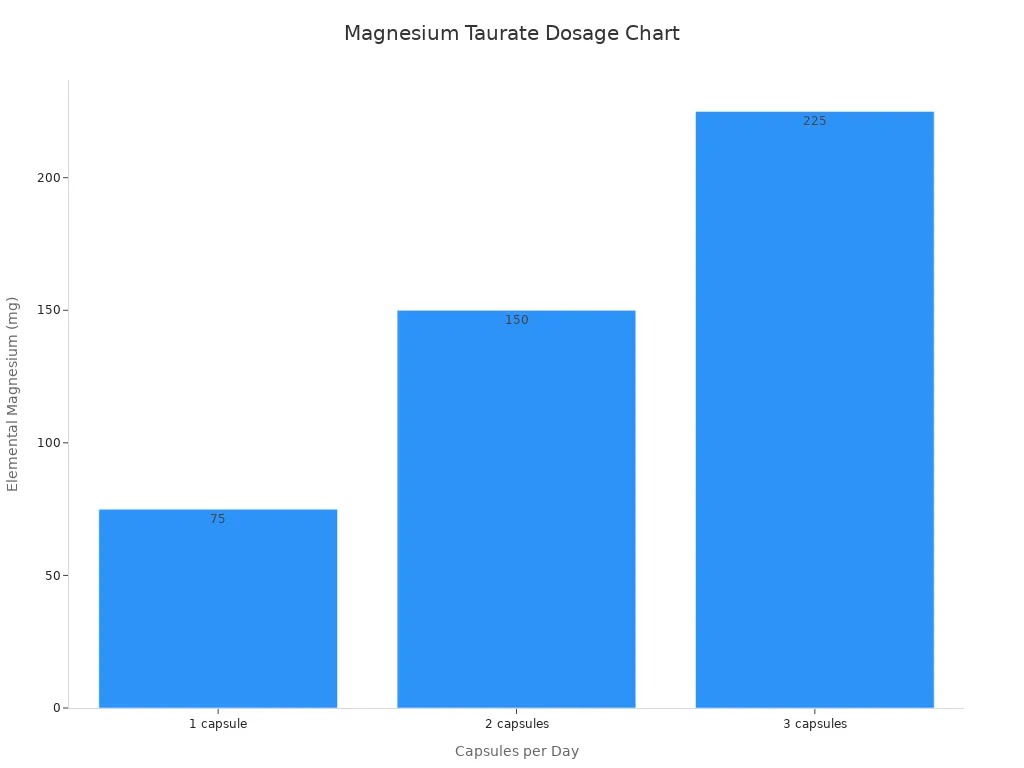Safety of Combining Magnesium Taurate and Glycinate for Wellness
Table of Contents

You can ensure the safety of combining magnesium taurate and glycinate supplements for wellness when you monitor your health and work with your provider. Most people tolerate these forms well, but only 7.6% of people in the US use magnesium supplements. If you have kidney problems or take medications, consult your healthcare provider before starting. Magnesium taurate supports heart health, while glycinate helps with stress relief. The table below illustrates that the safety of combining these forms can raise magnesium levels, so always check with your provider to protect your safety.
| Interaction Type | Description |
|---|---|
| Moderate Interaction | The safety of combining magnesium glycinate and magnesium taurate can elevate magnesium blood levels, especially in individuals with reduced kidney function. |
| Symptoms of High Magnesium Levels | Nausea, vomiting, flushing, drowsiness, dizziness, confusion, muscle weakness, reduced reflexes, low blood pressure, slow heart rate, and impaired breathing. |
Magnesium Supplements Overview

Magnesium Taurate
You may notice that magnesium taurate stands out among magnesium supplements for its calming effects and support for heart health. Taurate combines magnesium with taurine, an amino acid. This form is recognized as one of the most bioavailable magnesium salts. Organic magnesium supplements like taurate absorb better than inorganic forms. Effervescent magnesium supplements also show higher bioavailability. Clinical studies show that magnesium taurate can help manage hypertension and improve cardiovascular health. The table below highlights some findings:
| Evidence Type | Findings | Implications |
|---|---|---|
| Clinical Study | Magnesium taurate slows hypertension and reduces cardiotoxicity | May help manage blood pressure and heart health |
| Observational Studies | Magnesium and taurine regulate hypertension | Supports cardiovascular function |
| Mechanistic Insights | Magnesium affects nitric oxide and endothelial function | Shows how magnesium supports heart health |
Magnesium Glycinate
Magnesium glycinate is another popular choice among magnesium supplements. Glycinate combines magnesium with glycine, an amino acid. You may choose this form because it absorbs well and is gentle on your stomach. Human studies show that magnesium glycinate reaches about 80% absorption after six hours. Most absorption happens in your small intestine. Magnesium glycinate supports sleep quality and neurological functions. Some research suggests magnesium supplements may help reduce mild anxiety, especially in women with premenstrual symptoms. Magnesium may calm nerves by affecting NMDA receptors and GABA activity.
Key Differences
You may wonder how magnesium taurate and magnesium glycinate differ. The table below compares their features:
| Feature | Magnesium Taurate | Magnesium Glycinate |
|---|---|---|
| Other Names | Magnesium Ditaurate | Mg Bisglycinate, Mg Diglycinate |
| Parent Compound | Taurine | Glycine |
| Chemical Formula | C4H12MgN2O6S2 | C4H8MgN2O4 |
| Molecular Weight | 272.6 g/mol | 172.42 g/mol |
| Bioavailability | Moderate | High |
| Key Benefits | Calming, sleep, heart health | Sleep, metabolic health |
| Blood-Brain Barrier | Cannot cross | Cannot cross |
Magnesium supplements come in many forms. The table below shows how absorption rates compare:
| Magnesium Form | Absorption Rate | Notes |
|---|---|---|
| Magnesium Glycinate | High | Gentle on stomach, good for sleep support |
| Magnesium Citrate | High | Used for digestion, acts as laxative |
| Magnesium Malate | Moderate | Supports energy production |
| Magnesium Oxide | Low | Used for digestion and migraine relief |
| Magnesium Threonate | Moderate | May support cognitive function |
You can choose magnesium supplements based on your health needs. Taurate supports heart health, while glycinate helps with sleep and stress. Both forms offer gentle absorption and unique benefits.
Safety of Combining Magnesium Supplements
General Safety
You may wonder about the safety of combining magnesium supplements like magnesium taurate and glycinate. Most people can safely use these supplements when they follow recommended guidelines. The safety of combining these forms depends on your total magnesium intake and your health status. You should always check the upper intake limits for magnesium from supplements. Too much magnesium can cause side effects, especially if you have certain health conditions.
The table below shows the recommended upper limits for magnesium in dietary supplements and medications by age group:
| Age Group | Upper Limit (mg) |
|---|---|
| Birth to 12 months | Not established |
| Children 1–3 years | 65 |
| Children 4–8 years | 110 |
| Children 9–18 years | 350 |
| Adults | 350 |

Some organizations, like the Council for Responsible Nutrition, have raised the upper limit for magnesium from 400 mg to 500 mg per day for adults. However, you should not exceed these limits unless your healthcare provider tells you to do so.
When you combine magnesium supplements, you increase your total intake. This can help you get the benefits of both forms, but it also raises the risk of taking too much. You should monitor your health for any signs of excess magnesium, such as nausea, muscle weakness, or low blood pressure. If you notice these symptoms, stop taking the supplements and consult your healthcare provider.
You may find that combining magnesium supplements with other nutrients, like zinc, can support your metabolic health. Some studies show that this combination can improve blood sugar and cholesterol levels in people with type 2 diabetes and heart disease. However, more research is needed to confirm the safety of combining magnesium supplements with other minerals.
Tip: Always keep track of your total magnesium intake from all supplements and medications. This helps you avoid going over the safe limit.
Who Should Be Cautious
Some people face a higher risk when combining magnesium supplements. You should pay special attention to your health if you belong to one of these groups:
- Individuals with impaired kidney function
- People with chronic diseases
- Those taking high doses of magnesium supplements
- Individuals using magnesium-containing medications for extended periods
- Pregnant individuals treated for preeclampsia
- People using laxatives and antacids for long durations
If you have kidney problems, your body cannot remove extra magnesium as well. This increases the risk of magnesium buildup, which can be dangerous. People with chronic diseases or those who take magnesium supplements for a long time should also be careful. You should always consult your healthcare provider before combining magnesium supplements if you have any of these conditions.
Some medications can interact with magnesium supplements. The table below lists some common medications and the severity of their interactions:
| Medication | Interaction Severity |
|---|---|
| baloxavir marboxil | Severe |
| raltegravir | Severe |
| Proton Pump Inhibitors (e.g., Nexium, Prevacid) | Moderate |
| Zinc | Moderate |

You should inform your healthcare provider about all the supplements and medications you take. This helps prevent harmful interactions. If you use proton pump inhibitors for a long time, you should monitor your magnesium levels. If you take zinc, you should take it at a different time than magnesium to avoid absorption problems.
Note: Always consult your healthcare provider before starting or combining magnesium supplements, especially if you take other medications or have health concerns.
The safety of combining magnesium supplements depends on your health, your total intake, and your medications. You can protect your health by following these considerations and working closely with your provider.
Benefits of Combining Magnesium
Absorption
You can experience improved absorption when you combine magnesium supplements like magnesium taurate and magnesium glycinate. Both forms offer higher bioavailability than basic types such as magnesium oxide. Glycinate absorbs well and feels gentle on your stomach, while taurate helps your body maintain a healthy magnesium profile in your cells, bones, and muscles. When you take these supplements together, you may notice better absorption and more consistent magnesium levels. This means your body can use magnesium for muscle recovery, energy, and overall health.
- Magnesium glycinate increases solubility and absorption because it binds with glycine.
- Magnesium taurate supports absorption in organs and muscles, which can help you get the most benefit from your supplements.
Tip: If you want to maximize the benefits, choose magnesium supplements with high absorption rates and monitor your health for changes.
Heart and Nerve Support
Combining magnesium taurate and magnesium glycinate can offer strong benefits for your heart and nerves. Magnesium deficiency often appears in people with heart problems, which can lead to serious health risks. Clinical trials show that magnesium supplements may lower blood pressure and reduce the risk of arrhythmias. Magnesium taurate supports heart health by helping regulate blood pressure and protecting your heart from stress. Magnesium glycinate also helps your nerves function well.
- Magnesium ions play a key role in nerve repair and protect motor neurons from damage.
- Magnesium supplements can block harmful calcium entry into cells, which helps your nerves recover and function better.
- Magnesium supports cognitive function and may improve outcomes in brain injury and neurological conditions.
Stress Relief
You may find that magnesium supplements, especially magnesium taurate and magnesium glycinate, help you manage stress and anxiety. Research shows that these supplements can lower cortisol levels and reduce feelings of stress. A systematic review in Nutrients found that magnesium supplementation significantly decreases anxiety and stress symptoms. Many studies highlight the potential benefits and risks of using magnesium for mental health.
- Magnesium supplements can help you feel calmer and more relaxed.
- Magnesium taurate and magnesium glycinate have shown benefit in reducing anxiety and improving mood.
Note: Always consider the potential benefits and risks before starting new supplements, and talk to your healthcare provider about your health needs.
Risks and Side Effects

Possible Side Effects
When you use magnesium supplements like magnesium taurate and magnesium glycinate, you may notice some effects on your body. Most people tolerate these supplements well, but you can still experience mild effects. You might feel abdominal bloating, cramping, or diarrhea. Some people report nausea, vomiting, or facial flushing. These effects often happen if you take high doses or combine different forms of magnesium. If you have magnesium deficiency, your body may react differently to supplements. Always watch for changes in your health when you start new supplements.
If you feel muscle weakness or notice changes in your digestion, you should lower your dose or talk to your healthcare provider. These effects can signal that your body is getting too much magnesium.
Drug Interactions
You need to pay close attention to drug interactions when you take magnesium supplements. Magnesium can interact with many medications, especially if you use more than one drug. Older adults face a higher risk because they often take several medications. For example, diuretics can cause magnesium deficiency by making your body lose magnesium. Some antibiotics may not work as well if you take them with magnesium. These interactions can change the effects of your medications and supplements. You should always tell your healthcare provider about all the supplements and drugs you use. This helps protect your health and lowers the risk of negative effects.
Drug interactions can affect your health in many ways. Monitoring your magnesium levels helps prevent serious effects from elevated magnesium blood levels.
Signs of Excess Magnesium
You should know the signs of too much magnesium in your body. These effects can range from mild to serious. The table below shows common symptoms and their severity:
| Symptoms | Severity Level |
|---|---|
| abdominal bloating or distension | Mild |
| abdominal cramping or pain | Mild |
| diarrhea | Mild |
| muscle weakness | Mild |
| nausea and vomiting | Mild |
| facial flushing | Mild |
| abdominal pain (severe) | Serious |
| difficulty breathing | Serious |
| irregular heartbeat (arrhythmias) | Serious |
| urine retention | Serious |
| dizziness, lightheadedness | Serious |
If you notice any of these effects, especially the serious ones, stop taking your supplements and seek medical help. You can lower your risk by following the recommended dose and monitoring your health. Magnesium taurate and magnesium glycinate both offer benefits, but you must use them safely to avoid risks and negative effects.
Practical Guidance
Dosage
You need to choose the right dosage for your health and wellness goals. Most adults take magnesium taurate or glycinate in capsule form. Each capsule of magnesium taurate usually contains 75 mg of elemental magnesium. You can see how the dosage increases with more capsules:
| Formulation | Daily Dosage (Capsules) | Elemental Magnesium (mg) |
|---|---|---|
| Magnesium Taurate | 1 capsule | 75 |
| 2 capsules | 150 | |
| 3 capsules | 225 |

Your ideal dosage depends on your age, sex, and body weight. Lifestyle choices, such as your diet and activity level, also play a role. Some people need more magnesium if they have low dietary intake or high physical activity. Genetic factors may affect how your body uses magnesium, but more research is needed.
| Factor Type | Findings |
|---|---|
| Demographic Variables | Age, sex, and BMI influence magnesium levels, but results vary by population. |
| Lifestyle Factors | Dietary intake and physical activity levels are significant in determining magnesium needs. |
| Genetic Factors | Genetic polymorphisms may modulate magnesium levels, though their specific impact needs further study. |
| Dietary Patterns | Adherence to the Mediterranean diet did not show a significant association with plasma magnesium concentrations. |
Tip: Always start with the lowest effective dose and adjust only if your provider recommends it.
Monitoring
You should monitor your health when you use magnesium supplements. Regular checks help you avoid side effects and keep your magnesium levels safe. The most common way to check magnesium status is with a blood test, but this may not show your total body stores. Other methods include urine tests and special load tests.
| Method | Description |
|---|---|
| Serum Magnesium Measurements | Total serum or plasma magnesium is commonly used but not sensitive for body stores. |
| Magnesium Load Test | Most valid assessment; identifies deficiency in various conditions by measuring urinary retention. |
| Urinary Magnesium Excretion | Good indicator of intake but may not reflect stores due to rapid dietary response. |
| Erythrocyte Magnesium Measurement | Reasonable assessment of active body stores but labor-intensive and not suitable for routine use. |
You can ask your provider about the best way to monitor your magnesium status. Watch for changes in your health, such as muscle weakness or stomach upset, and report these to your healthcare provider.
When to Seek Help
You should know when to consult your healthcare provider about magnesium supplements. Stop taking supplements and get help if you notice any of these:
- Pain or symptoms of magnesium toxicity, such as nausea or muscle weakness
- Blood in your stool or black, tarry stools
- Any new or severe health symptoms
Note: Always consult your healthcare provider before starting magnesium supplements. This helps you stay safe and supports your health.
You can safely combine magnesium taurate and glycinate when you follow proper dosage and monitor your health. Regular checks of serum magnesium and kidney function help you avoid side effects like nausea or muscle weakness. Always consult your healthcare provider, especially if you have kidney disease or take medications.
- Choose third-party tested supplements for quality.
- Watch for signs of excess magnesium, such as stomach cramps or irregular heartbeat.
Tip: For most adults with healthy kidneys, 250 to 500 milligrams daily supports your health without risk.
FAQ
Can you take magnesium taurate and glycinate together every day?
Yes, you can take both daily if you stay within the recommended dose. You should check with your healthcare provider before starting. This helps you avoid side effects and keeps your magnesium levels safe.
What is the best time to take magnesium supplements?
You can take magnesium supplements with meals or before bedtime. Many people find that taking magnesium glycinate at night helps with sleep. Magnesium taurate works well any time of day.
How do you know if you are getting too much magnesium?
Watch for signs like nausea, diarrhea, muscle weakness, or irregular heartbeat. If you notice these symptoms, stop taking magnesium and contact your healthcare provider.
Tip: Keep a daily log of your supplement intake.
Do magnesium taurate and glycinate interact with common medications?
Some medications, such as antibiotics and diuretics, can interact with magnesium. You should tell your healthcare provider about all medicines and supplements you use.
| Medication Type | Interaction Risk |
|—————–|——————|
| Antibiotics | Moderate |
| Diuretics | Moderate |
| Heart Medicines | High |

Poseidon
Master of Nutritional Epidemiology, University of Copenhagen, Herbal Functional Nutrition Researcher
Focus: The scientific application of natural active ingredients such as Tongo Ali, Horny Goat Weed, and Maca to sexual health and metabolic regulation.
Core Focus:
Men: Use a combination of Tongo Ali (an energizing factor) + Maca (an energy reserve) to improve low energy and fluctuating libido.
Women: Use a combination of Horny Goat Weed (a gentle regulator) + Maca (a nutritional synergist) to alleviate low libido and hormonal imbalances.
Stressed/Middle-Aged Adults: This triple-ingredient synergy supports metabolism, physical strength, and intimacy.
Product Concept:
Based on traditional applications and modern research (e.g., Tongo Ali promotes testosterone-enhancing enzyme activity, and icariin provides gentle regulation), we preserve core active ingredients and eschew conceptual packaging—using natural ingredients to address specific needs.
Simply put: I'm a nutritionist who understands "herbal actives." I use scientifically proven ingredients like Tongo Ali, Epimedium, and Maca to help you make "sexual health" and "nutritional support" a daily routine.
